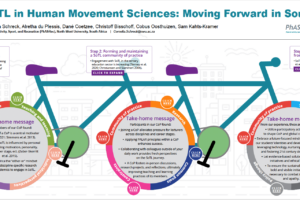Advocating for SoTL in Family Science
- Posted by ISSOTL Admin
- Categories Blog
- Date August 10, 2017
- Comments 0 comment
Written by Trent W. Maurer, Professor of Child & Family Development at Georgia Southern University
In the summer of 2016, the major open access pedagogical journal in my discipline, Family Science Review, published a special issue on SoTL in Family Science (Volume 21, Issue 2). I had the honor of being selected to serve as one of two co-editors for that special issue. I saw that position as a wonderful opportunity to advocate for SoTL in my discipline of Family Science and to help bring some of the conversations and literature in the broader international, interdisciplinary SoTL community into the disciplinary SoTL discourse in Family Science. As several of the articles in that special issue documented, SoTL has a very small footprint in Family Science, and few Family Science scholars make repeated or sustained contributions to the disciplinary SoTL literature. Thus, the need for SoTL advocacy in my discipline was clear. I chose to advocate in three primary ways: 1) By writing, with my co-editor, an introductory piece for the special issue that presented an overview of major issues in SoTL, 2) By directing manuscript authors to specific pieces of the broader interdisciplinary SoTL literature in which to situate their projects, and 3) By providing information to the journal’s readership about common deficits we observed in the manuscripts that were submitted and how to strengthen SoTL work in Family Science.
The introductory manuscript (Maurer & Law, 2016) was intended to introduce the topic of SoTL, and related issues, to a broad readership in my discipline, and provide them with an overview of what SoTL was all about. Remarkably, such a manuscript had never previously been published in my discipline! This manuscript contained seven foci: 1) Definitions and conceptualizations of SoTL, 2) Different models for evaluating SoTL scholarship, 3) Hutchings’ (2000) typology of SoTL questions, 4) Examples of SoTL in Family Science, 5) Benefits of engaging in SoTL, 6) Unique contributions Family Scientists could make to SoTL, and 7) Resources and recommendations for advancing SoTL in Family Science. This manuscript drew heavily on the broader interdisciplinary SoTL literature, and it was my hope that it might serve as a “bridge” between that literature and disciplinary Family Science SoTL scholarship.
The second form of advocacy took place during the peer and editorial review process for manuscripts submitted to the special issue. Nearly all of the initial manuscripts that were submitted for consideration contained no references to the broader SoTL literature. Instead, manuscripts typically were situated, if at all, in the limited disciplinary SoTL literature or the SoTL literature of adjacent fields (e.g., psychology, sociology, education). This limited both their reach and their utility. During the review process, I tried to direct each author to specific pieces of the broader SoTL literature (e.g., Felten, 2013; Hutchings, 2000) to assist them in situating their projects in that broader context. In doing so, I hoped to raise awareness of that broader SoTL literature both among the authors themselves and ultimately among the readership of their manuscripts.
Finally, as the process for putting together the special issue was nearing completion, my co-editor and I discussed the fact that we had observed the same common deficits in many of the submitted manuscripts. We felt that it would be helpful to the readership of the journal, and to future SoTL scholarship in our field, if we commented on these deficits and how scholars might address them. We hoped that by doing so, we might help to shape “better SoTL” in our field. In a sense, this was advocating not just for SoTL, but for better SoTL. The first deficit we identified was a lack of situating the manuscript within the broader SoTL literature, as described above. The second deficit, particularly in manuscripts that were rejected, was that measurements of student “learning” were typically operationalized in ways that were not about learning at all: student attitudes or opinions about instructional activities. Instead, we suggested that more direct measures of student learning like changes in knowledge, skills, or abilities, or even student self-reflection on learning and the learning process, might be more valuable SoTL evidence. In our introduction to the special issue, we noted these suggestions.
Although only time will tell if these advocacy efforts bear fruit, I can say that I am encouraged by the fact that the theme for the 2017 annual conference by my disciplinary teaching organization, the Family Science Association, is the Scholarship of Teaching and Learning in Family Science! Further, the definition of SoTL that was used in the conference announcement was the same one my co-editor and I had chosen as our working definition in our introductory manuscript (Maurer & Law, 2016). I am optimistic that SoTL may be gaining traction in Family Science.
References
- Felten, P. (2013). Principles of good practice in SoTL. Teaching & Learning Inquiry, 1(1), 121-125. doi: 10.2979/teachlearninqu.1.1.121
- Hutchings, P. (2000). Opening lines: Approaches to the scholarship of teaching and learning. Menlo Park, CA: Carnegie Foundation for the Advancement of Teaching and Learning.
- Maurer, T. W., & Law. D. (2016). The scholarship of teaching & learning in family science. Family Science Review, 21(2), 2-17. Retrieved from http://www.familyscienceassociation.org/familysciencereview/vol21/issue2%20
Previous post




